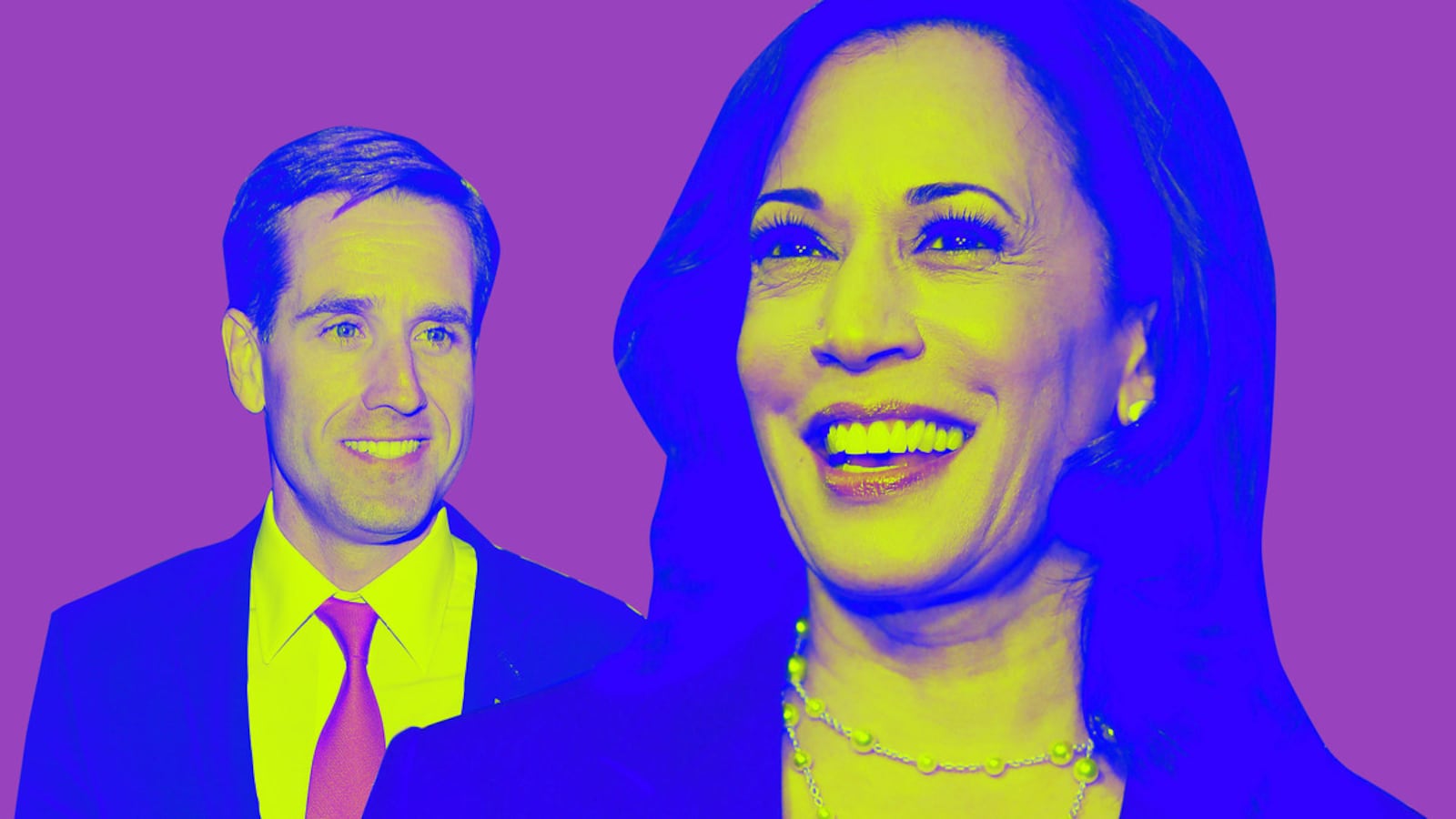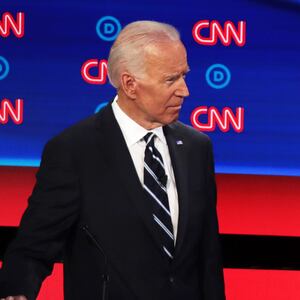Kamala Harris was mad as hell.
It was September 2011, the first year of her first term as California’s attorney general. The nation was still struggling to regain its economic footing after the Great Recession, and Harris was under intense pressure from the banking industry, the Department of Justice, and most of her fellow state attorneys general to accept a billion-dollar settlement from the mortgage-financing industry that would immunize them from investigations into other potential crimes committed in advance of the the subprime mortgage crisis. And she was not having it.
“This was insane,” Harris wrote in her pre-presidential memoir The Truths We Hold: An American Journey. “We hadn’t even finished the investigation, so we didn’t know what crimes we might uncover!”
California had more foreclosures in the wake of the subprime-mortgage collapse than any other state, and was home to seven of the 10 cities hit hardest by the crisis. Harris hoped to use the state’s clout to force the banks to drop the proposed settlement, giving her office a longer runway to investigate more malfeasance.
“There’s no way I’m taking this offer,” Harris told her team after a meeting in Washington, D.C., with the general counsels of the nation’s largest lenders. The next week, she announced that the proposed deal would “excuse conduct that has not been adequately investigated” without providing the relief that California homeowners desperately needed.
Then the phone calls began.
Friends, advisers, White House officials and even Gov. Jerry Brown warned her that she had made too powerful an enemy.
“The pressure was intense—and constant—and it was coming from all sides: from longtime allies and longtime adversaries and everyone in between,” Harris recalled in her memoir.
Only a few other state attorneys general, equally dissatisfied with the settlement’s proposed terms, supported Harris in holding out for more money and more time to investigate wrongdoing: Martha Coakley of Massachusetts, Catherine Cortez Masto of Nevada, Eric Schneiderman of New York, and Beau Biden of Delaware.
Biden, the crown prince of the Diamond State, was in his second term as Delaware’s attorney general, and had every reason to follow Justice’s lead on the settlement. The foreclosure crisis hadn’t hit Delaware nearly as badly as California, and the state’s friendly corporate arbitration system and even friendlier tax structure had made it a haven for the big banks.
“But that wasn’t who Beau was,” Harris later wrote. Biden opened his own investigation into the mortgage-financing industry as the settlement stalled, and began sharing the resultant information with Harris’ office—and “became an incredible friend and colleague” as a result.
“There were periods, when I was taking heat, when Beau and I talked every day, sometimes multiple times a day,” Harris recalled in The Truths We Hold. “We had each other’s backs.”
“That’s really where the two of them started to bond,” said Doug Gansler, a close friend of Beau’s and the former attorney general of neighboring Maryland who served as the president of the National Association of Attorneys General at the time. “She was sort of an instant rock star, as Beau was. They were destined to get together and collaborate.”
Harris’ holdout over the National Mortgage Settlement—which ended with a $20 billion victory for Harris instead of the $4 billion initially proposed by the banks, and more money for Delawareans, as well—was the beginning of what would be a close friendship between two rising stars in the Democratic Party. That friendship, cut short by Beau’s death from brain cancer in 2015, is now under renewed focus as former Vice President Joe Biden, Beau’s father and the presumptive Democratic presidential nominee, whittles down his list of potential running mates, a list at which Harris sits near the top.
“Short of personal friendship with Dr. [Jill] Biden, there is no bigger credit that you can have with the vice president than a relationship with Beau,” said one source close to the Bidens, who told The Daily Beast that the family, marked by tragedy and incredibly tight-knit after decades in the public eye, would naturally hold anyone with Beau’s stamp of approval in the highest esteem. “He was the heir.”
Both were young, telegenic, and bright even by the standards of the occupation, Gansler said, and largely aligned in their political beliefs. State attorneys general tend to break into three categories—workhorses without term limits who have served in the office for decades, journeymen who view the office as a pitstop on the road to lucrative private sector work, and the young legal minds with their eye on the governor’s mansion or the U.S. Senate.
Harris and Beau were in the last group, prominent enough that when Gansler was setting up a breakfast for Maryland’s delegation during the Democratic National Convention in 2012, he invited both to be the event’s speakers.
“They had the most star appeal, the most mystique, and both were sort of destined for even higher office, in my view,” Gansler said, explaining his choice. “And they both had great stories.”
Beyond the mortgage settlement, Harris and Biden worked together both formally and informally on legal issues on their docket, including fighting online child abuse imagery, sex trafficking, and elder abuse in nursing homes. Their friendship eventually included an introduction to Beau’s father, at the time the sitting vice president.
Beau’s illness, the severity of which he kept close to his chest until his final weeks, and his death at age 46 hit the tight-knit circle of state attorneys general hard.
“We were all rocked by the whole thing,” Gansler said, calling Beau’s memorial service, which Harris also attended, “devastating.”
In a way, Biden took the torch from his son in continuing a friendship with Harris, who introduced Biden at the party’s 2016 state convention as having given “so much to our country”—including his son, “my dear friend Beau.”
“It is through my friendship with Beau that I truly came to know Joe Biden, not just as a leader but as a person,” Harris said. “I say from my personal experience that the Biden family truly represents our nation's highest ideals—a powerful belief in the nobility of public service.”
Harris was elected to the U.S. Senate that year with the help of Vice President Biden’s endorsement over her Democratic challenger—“Beau always supported her,” Biden said in a statement announcing his endorsement, “and I’m proud to support her candidacy for the United States Senate”—and joined the judiciary committee that Biden had once chaired.
“They obviously weren’t as close as she and Beau were,” a friend of the family told The Daily Beast. “But she’d been welcomed into the fold, and that’s basically forever with the Bidens.”
But that relationship was changed—perhaps irrevocably, some close to Biden said—during the June 2019 Democratic presidential debate, when Harris came after Biden for his record on school busing and his friendship with senators who supported segregation.
“It was hurtful to hear you talk about the reputations of two United States senators who built their reputations and career on the segregation of race in this country,” Harris said during the debate, the first of the cycle. “And it was not only that, but you also worked with them to oppose busing. And, you know, there was a little girl in California who was part of the second class to integrate her public schools, and she was bused to school every day. And that little girl was me.”
In the context of other broadsides against Biden during subsequent debates—Sen. Elizabeth Warren of Massachusetts accusing him of running in the “wrong presidential primary,” Sen. Cory Booker of New Jersey mocking his position on marijuana legalization as only making sense if he’d been “high”—the moment was comparatively tame.
But it was the first moment of genuine conflict between the Democrats vying for the nomination, and came at a particularly sensitive time for the Biden clan, as President Donald Trump was injecting himself into the primary largely by attacking Biden’s younger son with baseless accusations of corruption.
As a result, in both the public imagination and in the hearts of Biden’s most dedicated supporters, the dispute has been hard to shake.
“If there was anyone on that stage that night that Joe Biden probably felt he trusted the most, it was her,“ said John Morgan, a Florida attorney and one of Biden’s top fundraisers. “And she was the one he could trust the least.”
Morgan told The Daily Beast that Harris’ debate performance in June 2019 is disqualifying for any potential running mate, and said that he found it “impossible” to imagine that Dr. Jill Biden would support Harris’ selection in light of what he called her “treacherous” performance after becoming so close with Beau.
“She didn’t stab him in the back—she stabbed him in the heart,” Morgan said.
Harris defended both her friendship with Beau and her line of attack in an appearance on The Breakfast Club radio show, calling him “an incredible person, an incredible human being and a very dear friend to me,” but saying that their friendship was “separate from the fact that segregationists in the United States Senate stood, and lived their careers, to segregate the races in public education in the United States.”
Although Biden was at first surprised by the attack, telling CNN that “I wasn’t prepared for the person coming at me the way she came at me,” he later made light of the exchange in the moments before the next debate, telling Harris to “go easy on me, kid” with an avuncular smile.
“I’m not good at keeping hard feelings,” Biden told reporters at a campaign stop in December, one day after Harris dropped out of the race. A source close to the campaign told The Daily Beast that Biden was one of the first to call her after she withdrew her candidacy, a conversation that was characterized as warm.
During a digital fundraiser that raised $3.5 million for the campaign last month, Biden called Harris a “principled leader,” and returned to her friendship with his late son.
“You said, ‘I love you, and I loved Beau’—I won’t forget that,” Biden said.
As Harris has begun the vetting process, the California senator has literally laughed off questions about the exchange and whether it could break her chances of joining Biden on the ticket.
“It was a debate!” Harris told Late Show host Stephen Colbert in June, laughingly repeating herself. “We all have family members or friends with whom we have disagreements—that doesn’t overcome or overshadow the commonalities between us or the connections between us.”
But some in Biden’s circle, and in the Biden family, have been slower to warm to Harris after the “little girl” moment. A source close to the Bidens told The Daily Beast that Valerie Biden Owens, the vice president’s sister and longtime adviser, is still “chilly” on Harris, and that Dr. Jill Biden was privately flippant when Harris endorsed her husband in March.
At an Illinois fundraiser eight months later, Dr. Jill Biden still seemed wounded.
“Our son, Beau, spoke so highly of her and how great she was,” she said when discussing potential vice presidential choices with the fundraiser’s attendees. “And not that she isn’t, I’m not saying that. But it was just like a punch to the gut. It was a little unexpected.”
The Biden campaign, which is generally loathe to comment on anything pertaining to the veepstakes, told The Daily Beast that the clash’s significance has been overplayed in the 12 months since it occurred, and that the vice president’s wife and sister have deep respect for Harris.
“Both Dr. Biden and Valerie have nothing but the utmost respect, admiration and affection for Senator Harris,” said Biden spokeswoman Elizabeth Alexander, in a statement that was previously given to the Washington Post. “Any rumors or conjecture to the contrary are not true and have zero basis in reality or fact.”
But those in a position to make their feelings on Harris’ potential as a running mate heard still point to the debate as potentially disqualifying—and note that both Dr. Biden and Valerie Biden Owens hold huge sway in any final decision on a running mate.
“I don’t think the emotions of Dr. Biden and Val have softened,” said one source familiar with the Biden family’s feelings on the matter, who allowed that polling on Harris’ utility as a running mate “and the persistent whispering of advisers trying to smooth things over” might change their opinions.
“But in the Biden world,” they continued, “it was an ultimate act of betrayal by someone whom Beau had trusted.”
Morgan, who like other top fundraisers has participated in calls to discuss potential running mates, told The Daily Beast that he has communicated his strong support for fellow Floridian Rep. Val Demings, in part because he believes she’s “loyal.”
“When you’re walking in and you’re guarded, and you’re looking around and there’s all these people onstage and you see one person, you go, ‘well, at least I don’t have to worry about her,’ and she’s the one that pulls out the Uzi, that’s hard to reconcile for me,” Morgan said. “But, you know, I’m Irish—I hold grudges.”
When The Daily Beast noted that Biden, too, is Irish, Morgan laughed and said: “He may be a gentler Irishman than me.”









